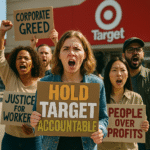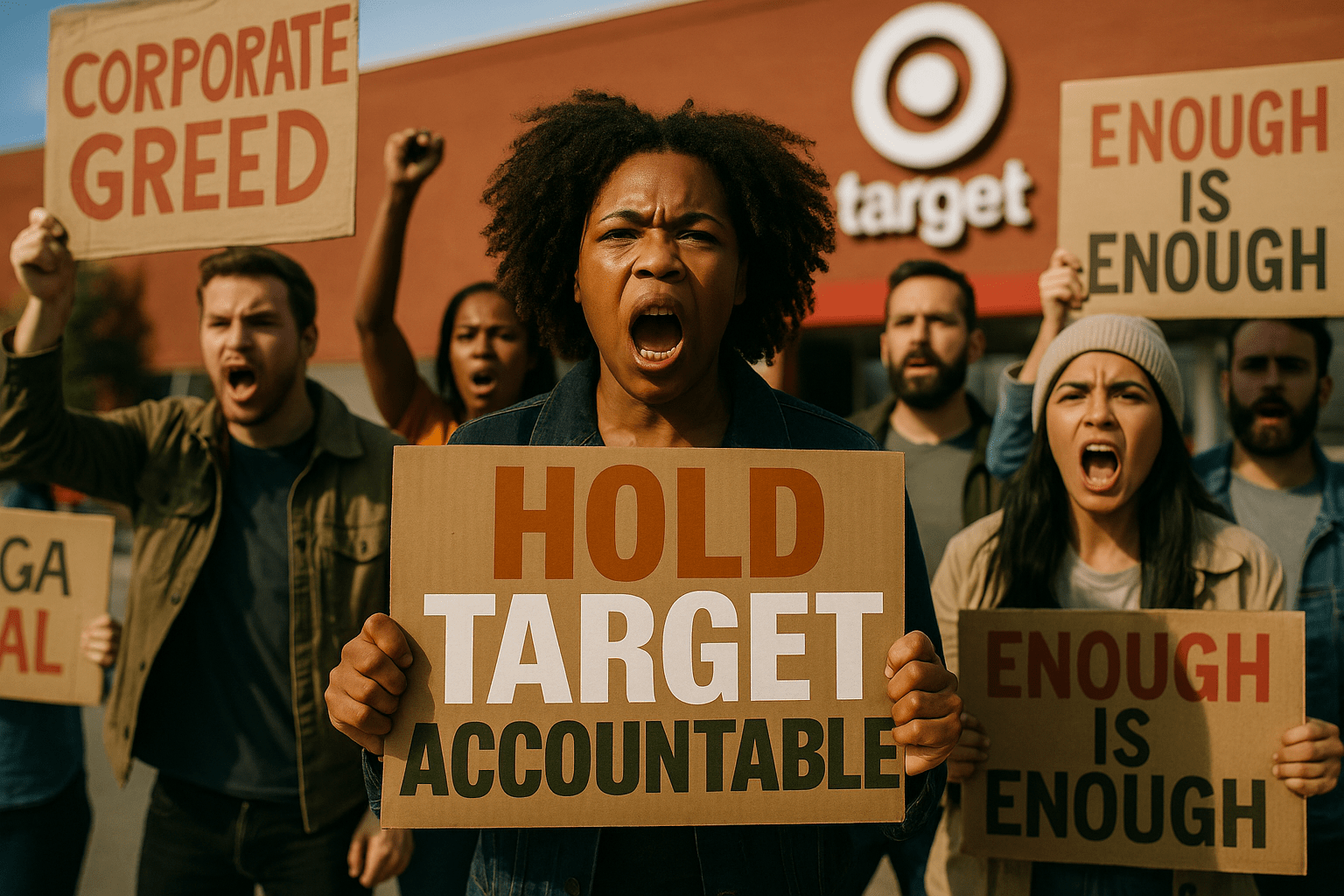

Target's DEI Retreat: A Costly Lesson
By Darius Spearman (africanelements)
Support African Elements at patreon.com/africanelements and hear recent news in a single playlist. Additionally, you can gain early access to ad-free video content.
Target's Broken Promises to Black Communities
Target is facing significant financial and reputational challenges. This is due to its perceived abandonment of diversity, equity, and inclusion (DEI) commitments, especially those made to Black communities. After George Floyd's murder in 2020, Target pledged to spend $2 billion with Black-owned businesses by 2025. The company also promised to increase its Black workforce by 20% and establish a Racial Equity Action and Change (REACH) committee (postnewsgroup.com). However, reports indicate that Target has gone back on these promises, making it a central point of protests (postnewsgroup.com).
The NAACP has urged consumers to “spend your money where you are respected, support Black-owned businesses, and demand businesses prioritize people over profit.” They specifically mentioned Target's actions (postnewsgroup.com). Black entrepreneurs, such as BLK & Bold, a coffee and tea brand sold in 1,500 Target stores, are feeling the effects of Target's DEI cuts. One co-founder stated, “Black entrepreneurs are cutting our teeth in ways we have not experienced before” (washingtonpost.com). Social media users have accused Target of discrimination and attempting to “monetize off of diversity and inclusivity while turning their back on POC” after reports of Black vendors being dropped (newpittsburghcourier.com).
Understanding DEI and Target's Retreat
What is Diversity, Equity, and Inclusion (DEI)?
Diversity, Equity, and Inclusion (DEI): Refers to organizational frameworks and initiatives designed to promote fair treatment, representation, and opportunities for marginalized groups within a workplace or society. It encompasses efforts to create a welcoming environment where individuals from all backgrounds feel valued and have equal access to resources and advancement.
Diversity, Equity, and Inclusion (DEI) refers to organizational frameworks and initiatives designed to promote fair treatment, representation, and opportunities for marginalized groups within a workplace or society. It includes efforts to create a welcoming environment where individuals from all backgrounds feel valued and have equal access to resources and advancement. DEI strategies aim to build inclusive workplaces and support HR professionals, employers, and job seekers in navigating evolving workplace dynamics (diversity.com). Companies committed to DEI actively seek to hire and retain a diverse workforce, ensuring equitable practices across industries (diversity.com). Furthermore, DEI initiatives often involve supporting specific programs, such as those aimed at helping Black employees advance or fostering relationships with minority-owned businesses (azcentral.com).
The Racial Equity Action and Change (REACH) Committee was a Target initiative aimed at helping Black employees advance within the company and supporting Black-owned businesses (azcentral.com). Target announced the termination of its REACH initiative in January 2025. This was part of a broader rollback of Target's DEI commitments, marking one of the largest corporate DEI rollbacks in recent history (diversity.com). The changes to Target's DEI commitments included ending the program aimed at supporting Black-owned businesses (azcentral.com).
The Boycott's Impact on Target's Finances
The boycott and public backlash have led to significant financial losses and internal unrest for Target. Target is “reeling from boycotts, employee revolt, and massive losses” (mshale.com). Some employees have expressed dissatisfaction, with one former manager citing an “insulting” 28-cent raise as a reason for leaving the company. Others have urged colleagues to unionize (mshale.com).
The boycott against Target was a multi-faceted protest initiated by various groups in response to the company's decision to scale back its DEI commitments in January 2025. It involved calls for consumers to stop shopping at Target, with specific campaigns targeting different demographics and timeframes (azcentral.com). A national Target boycott in honor of Black History Month began February 1, led by Minnesota activists (azcentral.com). The ongoing Latino Freeze movement encouraged Latinos to stop spending money at Target and other major retailers that cut DEI initiatives (azcentral.com). A 40-day boycott during Lent, led by Black church leaders, ended on April 17 (azcentral.com). Boycotts were also organized by The People's Union USA, including two economic blackouts in February and April (azcentral.com).
Financial Metrics and Boycott Effectiveness
Target's Financial Performance Indicators
Key Financial Metrics Explained
Financial metrics are crucial indicators of a company's performance and health, especially during consumer boycotts and shifts in corporate strategy. Market value refers to the total value of a company's outstanding shares, reflecting investor confidence and overall company worth. Comparable store sales measure the revenue generated by stores that have been open for at least a year, indicating the underlying sales trend excluding the impact of new store openings. Foot traffic quantifies the number of people entering physical stores, serving as a direct measure of customer engagement and potential sales. Earnings per share (EPS) represents a company's profit allocated to each outstanding share of common stock, a key indicator of profitability for investors (cnn.com, diversity.com, diversity.com).
While sales declines and stock drops at Target coincided with the boycott, it is difficult to definitively attribute all financial losses solely to the boycott. Other economic factors, such as weather and a drop in post-holiday spending, were also identified as potential contributors to the decline in foot traffic (cnn.com). Placer.ai noted that a variety of factors were likely to blame for the decline in foot traffic at Target stores (cnn.com). The big question is whether the reaction and boycott calls will cause long-term damage to Target, like they did to Bud Light, or fade away (itiger.com). A boycott campaign against Target could be hard to sustain because other chains that consumers might switch to, like Walmart or Amazon, have also rolled back DEI programs (itiger.com).
Timeline of Target's DEI Rollback and Boycott
Key Events in Target's DEI Controversy
Timeline of Target's DEI Rollback and Boycott
Target announced on January 24, 2025, that it would scale back its Diversity, Equity, and Inclusion (DEI) commitments. This included the termination of its REACH initiative and restructuring of its Supplier Diversity program (cnn.com). This decision triggered public backlash, legal scrutiny, and investor uncertainty (diversity.com). The broader social context that led to increased corporate DEI commitments, including those made by Target, was significantly influenced by heightened awareness and calls for racial justice, particularly following events like the murder of George Floyd. These events spurred many corporations to publicly commit to addressing systemic inequalities and promoting diversity, equity, and inclusion within their operations and communities (cnn.com, diversity.com).
A national Target boycott in honor of Black History Month began February 1, led by Minnesota activists (azcentral.com). Foot traffic at Target stores declined for 10 consecutive weeks following the DEI rollback announcement, down 9% year-over-year in February and 6.5% in March (cnn.com). A 40-day boycott during Lent, led by Black church leaders, concluded on April 17 (azcentral.com). The ongoing Latino Freeze movement encouraged Latinos to stop spending money at Target and other major retailers that cut DEI initiatives (azcentral.com). The People's Union USA also organized economic blackouts in February and April (azcentral.com).
Corporate Allyship and Future Implications
Target's actions are being contrasted with other major corporations that have maintained their commitment to DEI despite similar pressures. Companies like Costco, JPMorgan, and Apple have resisted pressures to roll back DEI initiatives (shoppeblack.us). JPMorgan CEO Jamie Dimon publicly defended DEI, stating, “Bring them on,” and reaffirmed the bank’s commitment to diverse communities (shoppeblack.us). Target's $2 billion pledge to Black-owned businesses was seen as a “lifeline,” and the REACH initiative helped Black entrepreneurs scale their products and receive promotional support (shoppeblack.us). Its retreat raises questions about whether DEI is a genuine commitment or merely a “checkbox” (shoppeblack.us).
The termination of Target's REACH initiative and restructuring of its Supplier Diversity program marked one of the largest corporate DEI rollbacks in recent history (diversity.com). The question of whether the boycott will cause long-term damage to Target, similar to Bud Light, is raised, implying that other companies have faced different outcomes regarding DEI-related controversies (itiger.com). It is noted that other chains like Walmart or Amazon have also rolled back DEI programs, suggesting that Target is not entirely unique in its actions, but the scale of its rollback is highlighted (itiger.com).
The impact of Target's DEI rollback on Black entrepreneurs is implied through the termination of programs designed to support Black-owned businesses (azcentral.com). While specific comprehensive data or testimonials on the widespread and severe impact are not provided, the cessation of such initiatives suggests a negative effect on the opportunities and support previously offered to Black entrepreneurs (azcentral.com). The broader social context that led to increased corporate DEI commitments, including those made by Target, was significantly influenced by heightened awareness and calls for racial justice, particularly following events like the murder of George Floyd. These events spurred many corporations to publicly commit to addressing systemic inequalities and promoting diversity, equity, and inclusion within their operations and communities (cnn.com, diversity.com).
ABOUT THE AUTHOR
Darius Spearman has been a professor of Black Studies at San Diego City College since 2007. He is the author of several books, including Between The Color Lines: A History of African Americans on the California Frontier Through 1890. You can visit Darius online at africanelements.org.
